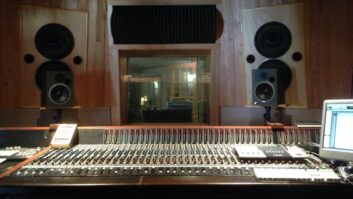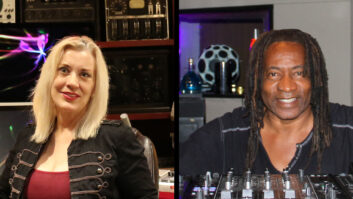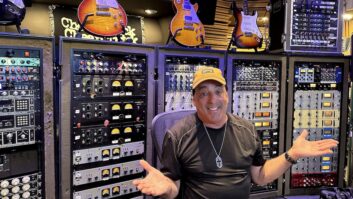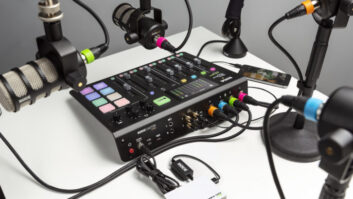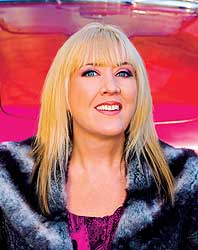
Johnny Cash said to me, “I don’t sing very good, and I’m not that good at playing the guitar either.” Hard to believe these words would have come out of his mouth, but the sweet, humble man honestly thought he wasn’t much of a musician. He would come to the session every day dressed as if he were going to a funeral, and he had a sadness about him. His deep resonant voice would tell those melodic American stories with so much emotion, you’d wish you could just hug him and tell him everything was going to be okay.
During the recording of Johnny’s Unchained, we wanted to give the disc a vintage character. While producer Rick Rubin enlisted a star-studded cast of players to back Johnny up on the record, I relied on the help of classic broadcast compressors to achieve the album’s unique sound. Rick also wanted simplicity in the way it was recorded and mixed, and as the engineer and mixer on the project, I learned invaluable lessons about how to uncomplicate the making of the record.
Much of the Unchained album was tracked at Ocean Way Studio 2, with most overdubs and mixing done in Rick’s studio at his home in West Hollywood. I would drag my racks of vintage gear to the sessions, loaded with old radio compressors and oddities that no other studios had. Out of those racks, we found the signature sound for Johnny’s voice for the record: the Gates Sta-Level tube-limiting amplifier. After first hearing it, the Sta-Level became the only limiter I used on Johnny’s voice, and it was the only special item I brought to vocal sessions.
I’d begun my love affair with the Gates Sta-Level years before when my friend Jimmy Boyle brought one to a mix and insisted I give it a try. It was old-looking and painted battleship gray. Not sexy at all. I would rather have used a Teletronix LA-2A for the vocal on that particular mix, but I reluctantly patched in the Sta-Level and was instantly smitten. The Sta-Level had all the muscle of the LA-2A, but was bigger and warmer, and even a bit grainy (in a good way). I immediately set out to buy one for my own rack, then two, then three. During the Johnny Cash sessions, it was the first thing I thought of when it came time to record his iconic voice. Even when I was sent to Nashville to record Johnny at Jack Clement’s Cowboy Arms Hotel and Recording Spa, I had a Sta-Level packed in my suitcase.
The Gates Radio Company out of Quincy, Ill., made the Sta-Level as an automatic gain amplifier for broadcast use from the mid-1950s through the mid-’70s. Popular in AM radio stations across the United States, it was used with a peak limiter to even out program content before it went on to the station’s transmitter. Credit for the sound of the Sta-Level is often given to its use of the 6386 tube, the same as you’ll find in both of the classic Fairchild compressors. In the broadcast world, the Sta-Level was wonderful for animating the classic AM radio announcer’s booming voice. You can then imagine why the Sta-Level was the perfect choice for recording Johnny, adding a touch of old radio flavor to the recording. You can especially hear the Sta-Level’s effects on the songs “The One Rose” and “I’ve Been Everywhere.”
We tracked the Unchained album over a span of six months, and every session included visits from huge stars, including Tom Petty and The Heartbreakers, “Blue Suede Shoes” legend Carl Perkins, country great Marty Stuart, Flea and Anthony Kiedis from the Red Hot Chili Peppers, Mick Fleetwood and Lindsay Buckingham from Fleetwood Mac, and, of course, June Carter Cash. It was easy to see Rick’s enthusiasm for the project: He was always early to the sessions and would even beat me to the studio on some days. Tom Petty, Mike Campbell, Benmont Tench and Howie Epstein brought such a great energy as Johnny’s back-up band, playing a colorful selection of instruments including Dobros, harmoniums and, of course, Tom’s signature Tele. I also brought my ’61 Fender Esquire, as it was the classic guitar used on so many of the early Johnny Cash records. But for me, the star of the show was the Gates Sta-Level.
Having started my recording career in radio production, I was lucky enough to know where to go to get my first Sta-Levels back in the mid-’90s. Today it may be more challenging to find these units, though they do appear every once in awhile on the market. Miraculously, there is a company out of Modesto, Calif., that’s now re-issuing the classic Sta-Level. The company is called Retro, and the owner/designer, Phil Moore, has a passion for the older broadcast equipment; he is developing re-issues of other classics, including a re-make of the great Universal Audio UA176. I highly recommend the Retro Sta-Level; it has been painstakingly designed to emulate the sound of the Gates, even though it no longer relies on the difficult-to-find 6386 tubes. In case you won’t stand for anything but the original design, the 6386 socket is still there as an option for the Retro user. How cool is that? These Sta-Levels are not plug-ins; they are living, breathing analog rack units that you have to make an effort to patch in … and it’s worth it.
The Unchained album was awarded the Grammy for Best Country Album in 1997, but unfortunately, Johnny was too ill to receive his statue at the event. A few short years later, and only months after June Carter Cash died, the great Johnny Cash passed away. We’ve all lost a legendary American voice, but we’re lucky to have his life documented in his music. Maybe he thought that he wasn’t the best singer or player, but certainly that is not at the heart of where true talent lies.
Sylvia Massy is the unconventional producer and engineer of artists including Tool, System of a Down, Johnny Cash, Red Hot Chili Peppers, Tom Petty and Prince. She is a member of the NARAS P&E Wing Steering Committee and Advisory Boards, and is a resident producer at RadioStar Studios in Weed, Calif.
